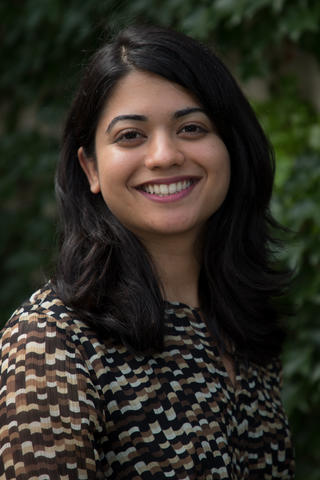
Reshma Gore
PhD Thesis:
Characterization of brain-derived neurotrophic factor (bdnf) and its receptor, tropomyosin receptor kinase B (TrkB), expression and function in the spinal nociceptive circuitry in a model of chronic neuropathic pain.
Current Position:
Technical Writer, Medtronic Corporation
Undergraduate Institution and Major:
University of Scranton, B.S. in Neuroscience, 2015
Graduate Advisor:
Lucy Vulchanova, Ph.D., Department of Neuroscience
Description of Graduate Research:
My thesis work focuses on BDNF-TrkB signaling in spinal cords of male and female mice in a model of neuropathic pain. Brain derived neurotrophic factor (BDNF) is widely studied for its role in various injury conditions. BDNF binds to its cognate receptor, tropomyosin receptor kinase B (TrkB) and initiates intracellular signaling cascade that ultimately results in over excitability of the neurons in the nociceptive spinal circuits. I use immunohistochemistry and western blots to visualize TrkB activation, Elisa assay to measure BDNF levels, and RNAscope to quantify BDNF and TrkB mRNA. I also measure nocifensive and reflex behaviors to test the effects of TrkB inhibition.
Graduate Publications:
- AAV-mediated gene transfer to colon-innervating primary afferent neurons. Front Pain Res (Lausanne). 2023 Aug 4;4:1225246.
- Skorput AGJ, Gore R, Schorn R, Riedl MS, de Velasco EMF, Hadlich B, Kitto KF, Fairbanks CA, Vulchanova L. Targeting the nociceptive somatosensory system with AAV9 and AAV2 retroviral vectors. PLoS One. 2022 Mar 10;17(3):e0264938.
- Gore R, Reidl MS, Kitto K, Fairbanks CA, Vulchanova L. AAV-mediated gene delivery to the enteric nervous system. Methods Mol Biol. 2019;1950:407-415.
- Silva H, Beura L, Wang H, Hanse E, Gore R, Scott M, Walsh D, Block K, Fonseca R, Yan Y, Hippen K, Blazar B, Masopust D, Kelekar A, Vulchanova L, Hogquist K, Jameson S. The purinergic receptor P2RX7 directs metabolic fitness of long-lived memory CD8+ T cells. Nature 2018;559:264–268
Graduate Oral Presentations
- Graduate Program in Neuroscience student colloquium 2018, 2019
- Capstone course guest lecture- Carleton College- 2018
Graduate Abstracts:
- Gore R, Esmail T, Marron E, Kitto K, Riedl M, Pflepsen K, Karlen A, McIvor RS,Honda CN, Fairbanks CA, Vulchanova L. AAV-mediated gene transfer targeting colon-innervating sensory neurons. Society for Neuroscience conference, Chicago, IL. Abstract, 2019.
- Gore R, Skorput AGJ, Reidl M, Huffman C, Vulchanova L. TrkB activation in chronic neuropathic pain. The Wallin Neuroscience Discovery Day neurosymposium. Minneapolis, MN. Abstract, 2019.
- Gore R, Esmail T, Marron E, Reidl M, Kitto K, Karlen A, McIvor S, Honda C, Fairbanks C, Vulchanova L. Dual targeting of colon innervating sensory neurons. Minnesota Neuromodulation Symposium. Minneapolis, MN. Abstract, 2019
- Gore R, Riedl MS, Skorput AG, Honda CN, Vulchanova L.Dual AAV vector targeting of colon innervating sensory neurons. Minnesota Neuromodulation Symposium. Minneapolis, MN. Abstract., 2018
- Gore R, Skorput AGJ, Reidl M, Huffman C, Vulchanova L.TrkB activation after nerve injury: time-dependent sex differences. The 17th World Congress on Pain. Boston, MA. Abstract, 2018.
- Gore R, Skorput AG, Riedl MS, Cook JL, Huffman C, Vulchanova L. Time- and sex-dependent TrkB activation after nerve-injury. Society for Neuroscience Conference, Washington D.C. Abstract, 2017.
- Gore RS, Riedl MS, Heyder H, Fairbanks CA, Honda CN, Vulchanova L. Selective peripheral neuromodulation through organ-specific AAV-mediated gene transfer. Minnesota neuromodulation symposium, Minneapolis, MN, 2017.
- Moen JK, Touchette JC, Gore RS, Maertens JJ, O’Rourke KY, Lee AM. Sex differences in protein kinase C epsilon regulation of nicotinic acetylcholine receptor-dependent behaviors. Second annual Wallin Neuroscience Discovery day symposium. Minneapolis, MN, 2017.
- Riedl MS, Gore RS, Heyder H, Honda CN, Vulchanova L. AAV-mediated transduction of primary afferent neurons following intracolonic viral vector administration. Society for Neuroscience Conference, San Diego, CA, 2016.
Graduate Awards:
- Stark Award Research Travel Grant, 7/2018
- Ruth L. Kirschstein National Research Service Award at the University of Minnesota, 6/2017-5/2019
- Ruth L. Kirschstein National Research Service Award at the University of Minnesota, 7/2015-5/2017
GPN Committees:
- Faculty Status Committee,, 2018-2020
- Community Outreach Committee, 2017-2019
- Marketing and Recruitment Committee, 2017-2019
Professional Outreach:
- Volunteer at Brain Camp at the Bell Museum, 2019
- Brain awareness presentation at Karner Blue Education Center, 2018
- Brain awareness presentation at Lyngblomsten Senior Facility, 2018
- Presenter at Saturday with a scientist “Brains On!” event at Bell Museum, 2018
- AMS STEM Academy outreach event, 2017, 2018
- Brain Booth at Minnesota State Fair, 2015-2019
- Minnesota State Brain Bee, 2016-2018
- Brain Awareness Week presentation at local middle schools, 2015-2018
Professional Memberships:
- International Association for the Study of Pain
- Society for Neuroscience, 2014-present
Research Category:
- Neuroscience of Pain and Somatosensation
Undergraduate Awards:
Neuroscience Student of the Year Award at the University of Scranton, 2015
Thesis Committee Members:
- Lucy Vulchanova, Ph.D., Department of Neuroscience
- Carolyn Fairbanks, Ph.D., Department of Neuroscience (Chair)
- Robert Meisel, Ph.D., Department of Neuroscience
- Marija Cvetanovic, Ph.D., Department of Neuroscience
Research Categories:
- Neurobiology of Pain & Somatosensation
Rotations:
Lucy Vulchanova, Ph.D., Department of Neuroscience
Anna Lee, Ph.D., Department of Pharmacology
Jonathan Gewirtz, Ph.D., Department of Psychology
Why Did You Choose MN?
The vibrant pain research community at UMN initially attracted me to this program. During interview weekend, I recognized that the Graduate Program in Neuroscience represented the ideal environment for scientific training due to its friendly, collaborative, and supportive nature combined with challenging and rigorous coursework.
What Advice Would You Give a First Year Graduate Student?
Stay curious and keep an open mind. You will be exposed to a ton of new ideas and information during the first year. Don’t be afraid to explore different research areas, but be mindful of the questions that capture your interests.
